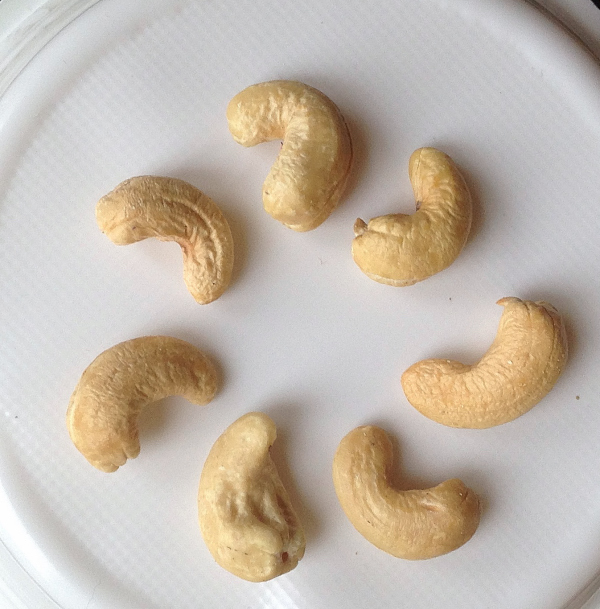Cashew (Anacardium occidentale L.) is a plant cultivated with high economic value. The production and commercial exploitation of the fruits of Anacardium occidentale are important components of the agricultural sector in countries such as India, Brazil, Mozambique, Tanzania and Kenya.
In addition to the famous 'nut' cashew (actually fruit), the shell liquid can be used as a source of phenol for various industrial purposes (1) and its various biological properties such as antimicrobial, anti-inflammatory, anticancer, antioxidant as well as insecticidal properties, they show a remarkable therapeutic potential thanks to anacardic acid, cardanol and cardanol (2).
Phytochemistry
The phytochemical composition of cashew juice (3) (mg / 100 g)
Bioactive compounds (mg / 100) RCAJ UNCAJ
Total vitamin C 86.22 ± 0.21 * 60.45 ± 0.55
Carotenoids 0.39 ± 0.02 0.21 ± 0.01
Phenolic total † 38.30 ± 1.78 * 14.84 ± 0.21
Anthocyanine 2.05 ± 0.03 * 0.69 ± 0.07
Flavonoids 3.92 ± 0.03 * 2.00 ± 0.17
Tannins
Dimerics 0.42 ± 0.07 0.27 ± 0.06
Oligomeric 0.34 ± 0.02 0.25 ± 0.01
Polymers 0.37 ± 0.06 0.24 ± 0.02
It also has significant high levels of total phenols (38.3 mg GAE / 100 g of juice), anthocyanins (2.05 mg / 100 g of juice), yellow flavonoids (3.92 mg / 100 g of juice), Vitamin C (86 , 22 mg / 100 g of juice).
The cashew nut also produces an essential oil (4). It has a positive effect on the epithelium in general.
Cashew nut extracts have demonstrated positive properties for human health because they contain only the positive components, but this nut in its entirety has some contraindications.
The FDA has not included cashews among the nuts approved for cardiovascular disease reduction because of their saturated fat content (5), and other studies have also not observed a positive influence of cashews (6).)
Cashew studies
References_______________________________________________________________________
(1) Oliveira M.S.C., Morais S.M., Magalhães D.V., Batista W.P., Vieira I.G.P., Craveiro A.A., Menezes J.E.S.A., Carvalho A.F.U., Lima G.P.G. Antioxidant, larvicidal and antiacetylcholinesterase activities of cashew nut shell liquid constituents. Acta Trop. 2010;117:165–170. doi: 10.1016/j.actatropica.2010.08.003.
(2) Kubo I., Muroi H., Himejima M. Structure–Antibacterial activity relationships of anacardic acids. J. Agric. Food Chem. 1993;41:1016–1019. doi: 10.1021/jf00030a036.
(3) Anti-inflammatory and wound healing potential of cashew apple juice (Anacardium occidentale L.) in mice.
da Silveira Vasconcelos M, Gomes-Rochette NF, de Oliveira ML, Nunes-Pinheiro DC, Tomé AR, Maia de Sousa FY, Pinheiro FG, Moura CF, Miranda MR, Mota EF, de Melo DF.
Exp Biol Med (Maywood). 2015 Dec;240(12):1648-55. doi: 10.1177/1535370215576299.
(4) Synthesis characterization and catalytic action of hexagonal gold nanoparticles using essential oils extracted from Anacardium occidentale.
Sheny DS, Mathew J, Philip D.
Spectrochim Acta A Mol Biomol Spectrosc. 2012 Nov;97:306-10. doi: 10.1016/j.saa.2012.06.009.
(5) Baer DJ, Novotny JA. Consumption of cashew nuts does not influence blood lipids or other markers of cardiovascular disease in humans: a randomized controlled trial. Am J Clin Nutr. 2019 Feb 1;109(2):269-275. doi: 10.1093/ajcn/nqy242.
Abstract. Background: The US Food and Drug Administration (FDA) approved a qualified health claim for tree nuts and reduction of cardiovascular disease. However, cashews are excluded from that claim due to their content of saturated fats, which is predominantly stearic acid. Because stearic acid is neutral with respect to blood lipids, several studies have been conducted to test the effect of cashew nuts on blood lipids, and these studies have produced conflicting results....Conclusions: Consumption of 1.5 servings of cashew nuts/d, the amount associated with the FDA qualified health claim for tree nuts and cardiovascular disease, did not positively or adversely affect any of the primary risk factors for cardiovascular disease. This trial was registered at clinicaltrials.gov as NCT02628171.
(6) Naghshi S, Sadeghian M, Nasiri M, Mobarak S, Asadi M, Sadeghi O. Association of Total Nut, Tree Nut, Peanut, and Peanut Butter Consumption with Cancer Incidence and Mortality: A Comprehensive Systematic Review and Dose-Response Meta-Analysis of Observational Studies. Adv Nutr. 2021 Jun 1;12(3):793-808. doi: 10.1093/advances/nmaa152.
![]() Cashew
Cashew 

